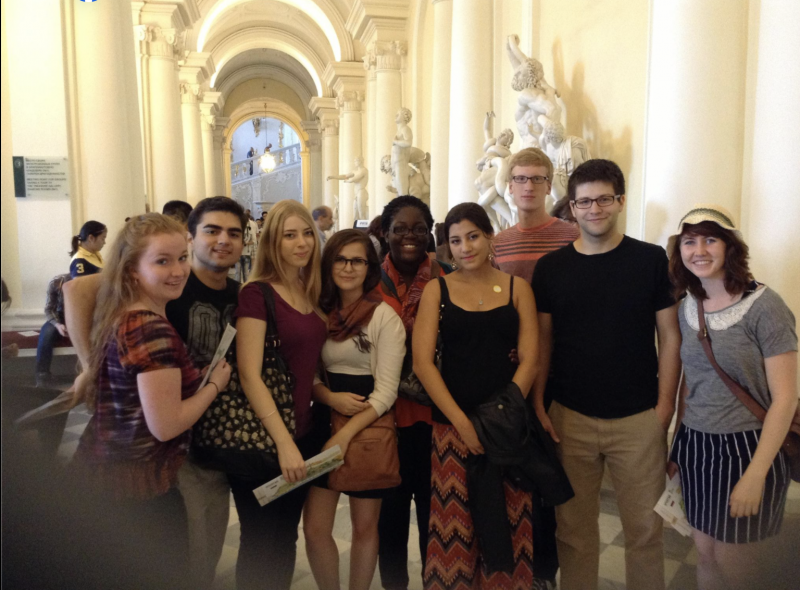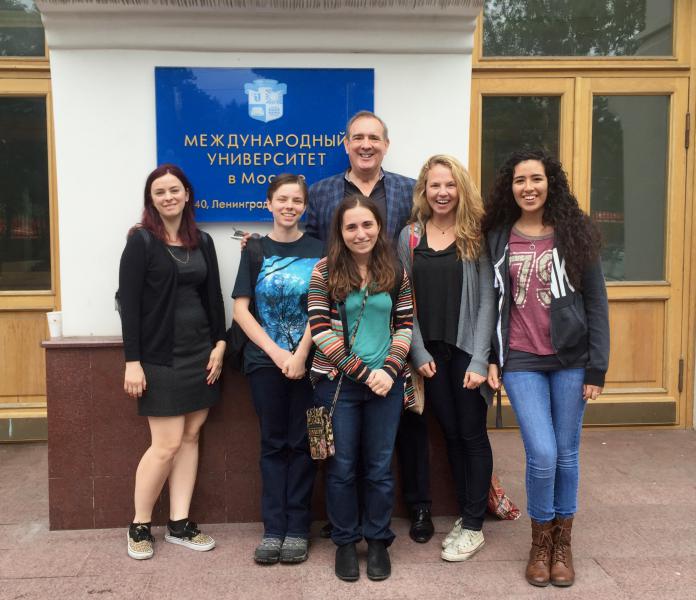Uncomfortable Conversations: On Preparing BIPOC University Students for Study in Russia
by Thomas Jesús Garza, University of Texas at Austin
Editor's note: This article originally appeared in the March 2021 issue of NewsNet. For sources cited, please click here.
 Going West…Or East
Going West…Or East
Study abroad during the undergraduate experience has been described as crucial to the development of intercultural competence (Maharaja 2018), a boost to creative thinking (Lee, Therrialt, & Linderholm, 2012), and a transformative experience (Stone 2014; Garza 2021). However, 2018-19 data from the Institute of International Education (IIE) indicate that of the 347,099 US students who participated in study abroad programs, only 31% identified as nonwhite and, as the Association of International Educators (NAFSA) remarks, “Although the diversity of study abroad participation has increased in recent years, minority students are still greatly underrepresented in study abroad programs” (NAFSA, n.d.). Abraham (2018) supports this position, citing cost and family situations as the primary reasons for lack of participation and, consequently, lack of diversity in US study abroad programs.
One solution to the issue of access to the benefits of study abroad is to create new or redesign existing programs that are more affordable and inclusive. Federally funded programs such as the National Security Education Program for Youth and the Critical Languages Scholarship Program for university-level students have been effective in creating access to study abroad for students at Tribal, HBCU’s, Hispanic and Two-Year Colleges, and other learner populations that have been historically underrepresented in study abroad. The Gilman International Scholarship Program, which provides funding to students with limited financial resources, has awarded more than 65 percent of its grants to nonwhite students. Programs such as these provide access to more students, but such opportunities are relatively few and cost still remains the primary reason given by students of color against studying abroad.
In spite of the evident inequities in study abroad, the inherent disparities in access to and success in such programs should not prevent BIPOC (Black, Indigenous, and People of Color) students from enjoying the advantages of study abroad, nor should it deprive them of the spontaneous interaction and authentic contact with the language and culture that “culminates in a transformative learning experience” (Garza 2021, 91). Not only should funders continue to make more study abroad programs more financially accessible to lower-income students, educators must also guard against further isolating underrepresented populations by making BIPOC participation and success in study abroad an accepted and expected part of their undergraduate experience. Laying the groundwork for successful participation of BIPOC students in study abroad programs in Russia begins with recruitment and retention. Inclusive programs must be branded and advertised as such, showing potential participants that students like themselves have had successful experiences.
(Un)Comfortable Conversations
Among many of the uncomfortable conversations taking place in the wake of the Black Lives Matter movement and the related revelations of the extent and depth of institutional racism in the US, preparation of BIPOC students to undertake study abroad demands a focused engagement of university personnel with students of color that involves a level of candor and truthfulness not usually sustained in orientation programs. Pre-departure preparation of students going abroad has long been a part of university programs, but only recently have issues of racial and ethnic identity been brought to the fore in the scholarship (Goldstein 2017). The usual advising process for white students who have prior travel experience to white-dominant regions is not the same for BIPOC students, many of whom have already dealt with racist micro- and macro-aggressions domestically. For inclusive programs, advising and orientation are often enhanced by peer counseling and mentoring, if possible, by BIPOC faculty and/or staff. As our institutions develop records of successful, diverse, representative cohorts of students abroad, we will be able to draw upon the expertise and experience of BIPOC alumni of these programs to help mentor and advise new students of color in our programs. First-hand accounts of experiences and challenges, both positive and negative, during study abroad are invaluable in dispelling anxieties and doubts some BIPOC students may have about programs in Russia.
It is at this early stage of preparation for study abroad that difficult conversations must be initiated. While most BIPOC students are already aware that racism and stereotypes know no geopolitical boundaries, some may not be prepared for the region-specific prejudices of post-Soviet communities. As with any orientation aimed at combatting aggressive forms of culture shock, establishing expectations of behaviors and/or practices goes far in helping students cope with them if and when encountered. Thus, BIPOC students will benefit from a candid discussion about white Russia’s contemporary attitudes towards Asians, people from the Caucasus, and indigenous peoples of Siberia, among others. This context helps to prepare them to understand why they might find themselves as the object of a racist comment or act, including public harassment. One key takeaway from this discussion is for BIPOC students who are victims of a racist act: Remember, it’s not your fault. Once students are able to decouple their identity from the assault, it becomes more possible for them to process the incident and not focus blame on the individual(s) who committed the offence. As traumatic and offensive as the event is at the moment, non-engagement is the best response. That does not mean that episode should be forgotten or pushed aside; often writing about the incident can help students work through their responses in a productive way.
In addition to preparing BIPOC students for the study abroad experience in Russia, program group leaders accompanying the group also need to be made aware of the sociocultural particulars of the regional destination, as well as of the kinds of stereotyping and related racial aggressions that can occur. Their intervention will also be critical within the group, as incidents of racial/ethnic aggression are not unique to the environment abroad. Pre-departure role-playing activities of racial micro-aggressions can help participants to focus on potential situations and better understand their respective roles in ameliorating such occurrences.
Group leaders should also work closely with their partner institutions to ensure the creation of a safe and supportive ecology for all students once in country. Even in 2020 many post-Soviet universities are ill-equipped, institutionally or personally, to accommodate individual differences within a group of students. Simply meeting with local administrative and instructional staff prior to the group’s arrival to discuss the expectation of a prejudice-free learning space can go a long way to foster an ecology of equity and inclusivity for all students in class. Nonetheless, all programs abroad should have a “safety net” in place for BIPOC students who are faced with unexpected difficulties. This support system might be a dedicated faculty member at the institution abroad who had worked with program and US students of color before, and a US contact for matters that need resolution outside of the site abroad.
 We’re Not in Kansas Anymore
We’re Not in Kansas Anymore
Upon arrival in Russia, all participants in the program should adhere to the “buddy system,” ensuring that no person goes out unaccompanied by at least one other student. This policy, which should be part of any group studying abroad, is essential for BIPOC students. Not only is it advisable to have a companion for safety in a new environment, it is also a practice that aids in building camaraderie and good will among the members of the student cohort. Empirical evidence also shows that BIPOC students, especially women, are more likely to avoid racist confrontations when with a partner (Willis 2015, 217).
It is important to acknowledge to BIPOC students that racist aggressions in the study abroad context are different from those that occur domestically, not only in substance, but also in effect. That is to say, for example, the overt use of racial epithets in public places is more commonplace in parts of the post-Soviet lands; but further, BIPOC students do not have access to the same kinds of support from family, friends, even institutions while abroad. Thus the impact of these micro- and macro-aggressions might be more intense and sustained than if they had occurred in the home institution.
Finally, the usual phenomenon of “culture shock” that is expected for many students travelling and studying abroad can be exacerbated by the occurrence of racial/ethnic aggressions. For BIPOC students abroad, studying and interacting in a different language, living with new people in a different environment, and eating new foods while having an identity that marks you as different at best, inferior at worst, creates a unique strain. Every minute of every day, BIPOC students are not only “foreign” students in Russia; they are “different.” And the response to that difference, in Goldoni’s (2017) words, can be “innocent, investigatory, or prejudicial” (234). In cases of prejudicial treatment, BIPOC students may find a simple act, such as standing and waiting for the next metro train, to be the trigger for an act of racial aggression. Students of color might benefit from the practice of “process journaling,” the regular recording in writing of their experiences – good, bad, and ugly – during their program. This practice not only serves the immediate purpose of creating a sense of clarity to the day’s events, but it also ameliorates the pain of those events borne out of racial prejudice and ignorance. It will further serve as a record of survival and excellence for future BIPOC students who want to make the venture to the post-Soviet lands, ensuring that our programs abroad continue to be inclusive and equitable for all of our students.
Thomas Jesús Garza (Ed.D. Harvard University) is UT Regents’ and University Distinguished Teaching Associate Professor in the Department of Slavic and Eurasian Studies, and Director of the Texas Language Center at the University of Texas at Austin, where he has received more than a dozen teaching awards during his 30-year tenure there. He has completed a manuscript on filmic and cultural portraits of machismo in contemporary Russian and Mexican cultures and is now working on a cultural portrait of Vladimir Vysotsky in the Americas.
